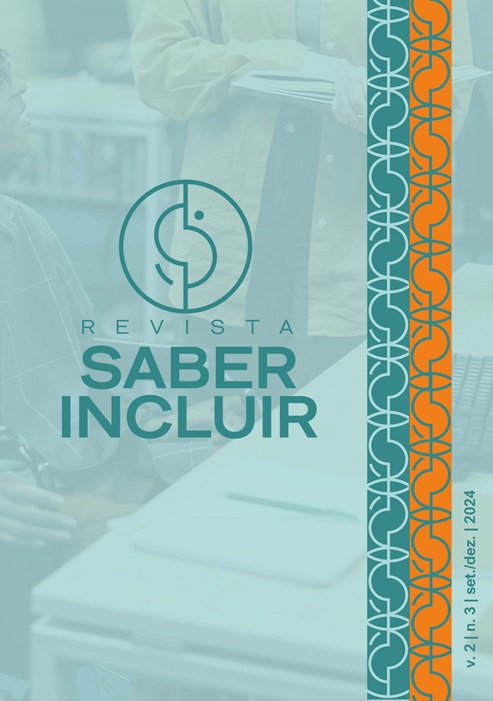INCLUSIVE PRACTICES IN SPECIAL EDUCATION: the role of the Libras interpreter in school mediation
Keywords:
Bilingual education, Inclusion of the deaf, Libras interpreter, School mediation, Teacher trainingAbstract
This study investigates the essential role of Brazilian Sign Language (Libras) interpreters in the inclusion of deaf students in regular education, highlighting their function as cultural and educational mediators. Beyond translating content, interpreters facilitate communication between deaf students, teachers, and hearing peers, promoting the appreciation of deaf culture and the development of inclusive pedagogical practices. The research examines public policies, such as Law No. 10.436/2002 and Decree No. 5.626/2005, which regulate the use of Libras in the Brazilian educational system. Although these policies have led to significant advancements, challenges remain, particularly regarding the continuous training of interpreters and their integration into the school environment. Studies suggest that interpreters require ongoing training to act as mediators in the teaching-learning process, going beyond linguistic translation. The recognition of deaf culture in schools is crucial for full inclusion, ensuring that the linguistic identity of deaf students is respected. The study concludes that revising the curricula for the training of teachers and interpreters, with an emphasis on bilingual education and the appreciation of deaf culture, is essential to promote truly inclusive education. Additionally, strengthening public policies and investing in the joint training of interpreters and teachers are identified as key to the success of this inclusion.
Downloads
References
ALMEIDA, D. F.; COSTA, M. A. Educação bilíngue inclusiva para surdos como espaço de resistência. Proposições, v. 31, n. 1, p. 45-61, 2020. Disponível em: https://periodicos.sbu.unicamp.br/ojs/index.php/proposic/article/view/8660700. Acesso em: 21 out. 2024.
BRASIL. Decreto nº 5.626, de 22 de dezembro de 2005. Regulamenta a Lei nº 10.436/2002 e dispõe sobre o ensino de Libras e da Língua Portuguesa para surdos. Diário Oficial [da] República Federativa do Brasil, Brasília, DF, 23 dez. 2005.
BRASIL. Ministério da Educação. MEC realiza formação docente para educação bilíngue de surdos. Disponível em: https://www.gov.br/mec/pt-br/assuntos/noticias/2024/julho/mec-realiza-formacao-docente-para-educacao-bilingue-de-surdos. Acesso em: 21 out. 2024.
FERREIRA, J. S.; LOPES, C. A. O trabalho do intérprete de Libras nos Institutos Federais: perspectivas e desafios. Revista Partes, 2023. Disponível em: https://www.partes.com.br/2023/05/16/o-trabalho-do-interprete-de-libras-nos-institutos-federais-perspectivas-e-desafios/. Acesso em: 21 out. 2024.
LOPES, L. M.; COSTA, J. L. O profissional de Libras e a mediação na sala de aula. Anais do Congresso Internacional de Educação e Tecnologia, 2021. Disponível em: https://repositorio.aee.edu.br/bitstream/aee/18153/1/Lorena.pdf. Acesso em: 21 out. 2024.
MACHADO, G. M. M.; SILVA, M. F. A mediação de uma intérprete educacional de Libras na inclusão de um estudante surdo em aula de inglês. Revista Signótica, v. 32, n. 2, 2020. Disponível em: https://revistas.ufg.br/sig/article/download/64123/36599. Acesso em: 21 out. 2024.
NASCIMENTO, E. C.; PEREIRA, R. S. A inclusão escolar de estudantes surdos: o que dizem estudantes, professores e intérpretes. Cadernos CEDES, v. 41, n. 115, p. 120-135, 2021. Disponível em: https://www.scielo.br/j/ccedes/a/KWGSm9HbzsYT537RWBNBcFc/?format=pdf. Acesso em: 21 out. 2024.
OLIVEIRA, A. C.; PEREIRA, L. A. S. O intérprete educacional de Libras: a mediação no processo de avaliação do estudante surdo. Zenodo, 2020. Disponível em: https://zenodo.org/records/3605282/files/O%20inte%CC%81rprete%20educacional%20de%20Libras-%20a%20mediac%CC%A7a%CC%83o%20no%20processo%20de%20avaliac%CC%A7a%CC%83o%20do%20estudante%20surdo.pdf. Acesso em: 21 out. 2024.
RODRIGUES, P. M.; FERNANDES, A. L. O papel dos intérpretes de Língua Brasileira de Sinais no contexto escolar: desafios e perspectivas. Revista Humanidades & Inovação, v. 7, n. 13, p. 120-130, 2020. Disponível em: https://revista.unitins.br/index.php/humanidadeseinovacao/article/view/7705. Acesso em: 21 out. 2024.
SANTOS, V. P.; MELO, T. F. A cultura surda na educação de surdos: uma análise das práticas pedagógicas. Anais do Congresso Nacional de Educação Inclusiva, 2020. Disponível em: https://editorarealize.com.br/artigo/visualizar/35087. Acesso em: 21 out. 2024.
SILVA, R. A.; MORAIS, M. F. A educação das pessoas surdas no Brasil: uma análise ao longo dos anos. Educação em Revista, v. 36, n. 1, p. 15-29, 2021. Disponível em: https://www.scielo.br/j/edur/a/Qqr4YJpLGLKncgGNG4RnWNG/?format=pdf. Acesso em: 21 out. 2024.
Downloads
Published
How to Cite
Issue
Section
License

This work is licensed under a Creative Commons Attribution-NonCommercial 4.0 International License.





